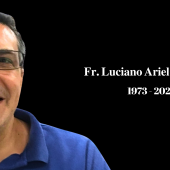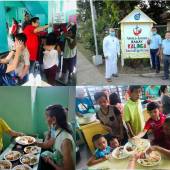Jesuits provide free food to 140,000 people at Philippines General Hospital

The pastoral care and chaplaincy office at the Philippine General Hospital (PGH), a tertiary state-owned hospital in Manila, has run the "Daily Bread Program" for watchers of indigent patients in charity wards for decades.
It is a feeding program for watchers of indigent patients in PGH charity wards—those who can hardly have food to eat inside the hospital and its premises.
"We give them food coupons that they can use to buy food in the hospital canteen, and the canteen will bill us monthly," said Jesuit Fr. Marlito G. Ocon, a chaplain at PGH.
After some assessment processes by the Social Service, they are given a coupon that they can use to buy food at the Bayanihan (community) canteen.
"We pray and remember with gratitude to God, to all our donors, and to all those who supported us in this ministry for the sick and the poor," Fr. Ocon said. "It's hard to be poor, but it's harder to be poor when one is sick."
The pastoral care and chaplaincy office at PGH is grateful to everyone who helps.
"Donors have eased the burden that our poor and sick brothers and sisters are going through. Truly, donors proved that no one is so poor that he can’t give, and no one is so rich that he cannot receive," the priest said.
The "Daily Bread Program" depends on the donations and money that the pastoral care and chaplaincy offices raise.
"For now, on average, we can only afford to release around 140,000 coupons per month, benefiting around 300 people daily. We survive by day, so if we have more donations, we can help more," Fr. Ocon explained.
Besides, the chaplaincy office also feeds 200 watchers outside the Emergency Room daily. "We distribute a grocery pack containing rice, sardines, noodles, canton, and coffee to all in the charity wards for their families left behind at home," he said.
Additionally, the chaplaincy office assists patients with any treatments and procedures that the hospital is unable to pay for.
At present, three Jesuits take turns on 24-hour duty daily at PGH. Fr. Ocon has been a chaplain for the last eight years.
Some of the pastoral and sacramental services they provide include a daily bread-feeding program for watchers, financial support for medicines, medical procedures, diagnostics, and equipment needed for charity patients, and a milk supplement program for cancer patients on chemotherapy or any patients that need special milk.
The chaplaincy office provides wheelchairs for patients in rehab programs, support for hygiene needs (diapers, alcohol, face masks, toothpaste, and toothbrushes), and daily sick visits.
The sacramental services are Mass, confession, communion, anointing of the sick, emergency baptism, counseling, spiritual direction (for patients and health workers), mass weddings for workers, confirmation for chronically ill patients studying in the PGH school program, and retreats and recollection for volunteers and health workers.
When asked about his experience as a chaplain, Fr. Ocon said, "It is very challenging. Every day is a challenge to go beyond your comfort zone to do the work beyond your sacramentals. Just like Jesus, when he saw the crowd hungry, he was moved with pity, so you cannot say, ‘I am here as a chaplain,’ you must do all to all... I am a priest or chaplain, but sometimes I must be like a social worker and fundraiser."
Speaking in terms of the importance of the church’s pastoral ministry to the sick, the priest underscored its relevance.
“It is important because that has been the mission of the church from the very beginning,” he said.
When Jesus sent the disciples, he did not only say, "Go and pray the rosary," he said, "Go baptize them, heal the sick, and feed them," because that was the mission of the church from the very beginning.
Biblically, much of Jesus’ ministry has been not only teaching but also healing and feeding.
Founded in 1907, PGH has 1,100 charity beds and 400 private beds. Since the beginning, Jesuits and others have provided pastoral care to the sick at PGH.
"Our challenge is to remain strong and healthy emotionally, psychologically, and physically because when you see poor people suffering and dying, it will drain your energy and you will be facing your vulnerability," Fr. Ocon concluded.
Radio Veritas Asia (RVA), a media platform of the Catholic Church, aims to share Christ. RVA started in 1969 as a continental Catholic radio station to serve Asian countries in their respective local language, thus earning the tag “the Voice of Asian Christianity.” Responding to the emerging context, RVA embraced media platforms to connect with the global Asian audience via its 21 language websites and various social media platforms.














